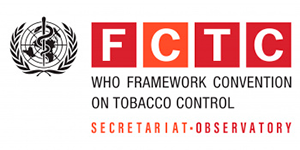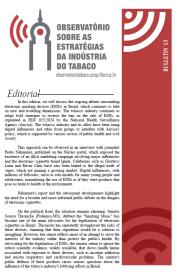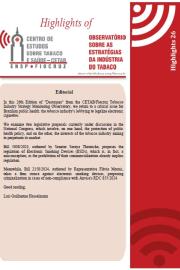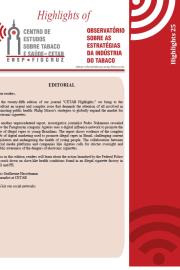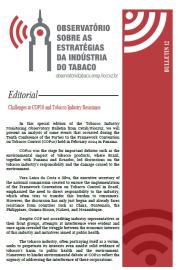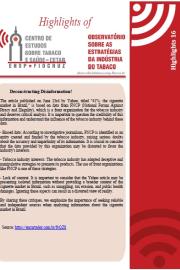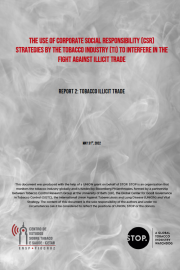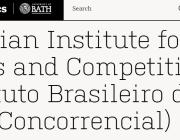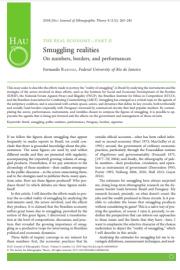In 1991, Merrill Rose, executive vice president of public relations firm Porter/Novelli, advised companies on techniques involving third parties:
"Put your words in someone's mouth... .There will be times when the position you defend, no matter how well framed and well-founded, will not be accepted by the public, simply because you are who you are. Any institution with a commercial interest veiled in the solution of an issue faces a natural barrier of credibility to overcome with its audience, and often with the media."1.
The tobacco industry employs this tactic, where arguments in favor of tobacco are defended by apparently independent third parties.
In Brazil
The tobacco industry in Brazil has been associated with several groups that use the discourse of freedom of choice, promotion and social and competition justice, but actually want to promote their products. They get involved in sectoral chambers occupying spaces within governments such as the ETCO Institute, or in partnerships with state governments such as the EKLOOS Institute. There are also those that join groups that use speeches to collaborate with other companies to manage their businesses, such as Instituto ETHOS.
background
This is a tactic used not only by the tobacco industry but also to give credibility to companies that carry out controversial industrial activities. Many companies have found it unhelpful to use corporate spokespersons to defend themselves.
According to the Tobacco Tactics website, Amanda Little, who works at public relations firm Burson.Marsteller in Sydney, Australia, said at a 1995 advertising conference:
“For the media and the public, the company will be one of the least reliable sources of information, whether about its own product or about safety or environmental risks. goal. Developing third-party support and validation for core corporate risk messages is critical. This support should ideally come from medical authorities, political leaders, union representatives, respected researchers, law enforcement and fire officials, environmentalists, and regulatory body representatives." .
Sometimes techniques involving third parties are explicit and the industry and/or its front groups pay for these views. In 2011, for example, the group Privacy International, which runs campaigns in support of civil liberties, produced a report on smoking and privacy, commissioned and paid for by the pro-tobacco group Forest . 2.
More often, financial ties are less transparent. They can be overshadowed to hide links between industry and shell groups. While the goal is to persuade public opinion that a broad spectrum of people and organizations share the industry's vision, techniques involving third parties do not necessarily seek to undermine public opinion ''per se'' . This is a battle the tobacco industry has already lost. The goal of the tobacco industry is not to win a good public relations campaign, but to avoid losing political and legal battles. The survival strategy (''survivalist'') has worked for the tobacco industry for forty years.
Surveys of internal tobacco industry documents, formerly classified as secret, show that the industry employs techniques involving third parties as a strategy quite often and, as noted below:
Philip Morris's links to the Australian Retailers Alliance.
As such, industry allies and those promoting a tobacco-friendly agenda should be scrutinized more closely for possible links with manufacturers.
Variety of techniques
Techniques involving third parties come in many forms and not all of them are camouflaged. They begin with the familiar ''lobbying'', establish networks and build alliances. When there is a financial link, help or - when the link is hidden - the use of 'shell groups' is also hired. A specific use of 'facade groups' is called "''astroturfing'' ®".
Building alliances
The most natural way, so to speak, of a technique involving third parties is to build alliances with those involved with the industry in some way. This includes, for example, employees, unions or consumers. Business organizations, representing either the industry or a broader coalition of transnational corporations, can be effective in lobbying groups and Transnational lobbying networks.
For example, in the UK, small retailers' organization, the National Federation of Retail Newsagents, has become known for taking money from British American Tobacco to campaign against planned regulation of Point of Sale Advertising for tobacco products.
Celebrities
The tobacco industry archives contain numerous documents revealing how celebrities have been used by the industry to:
- Promote "smoking and tolerance" 3;
- Participate in cigarette advertising 4;
- "Smoking KOOL [cigarettes] in movies" 5;
- Participate in industry-sponsored sporting events with "great television possibilities" 6.
Forest Celebrities
The industry-funded front organization Forest has a "Board of Supporters" made up of celebrities. Some of these celebrities publicly speak out against laws that Forest also disqualifies, such as smoking bans or proposals for generic packaging. Sometimes, however, his connection to Forest is not mentioned, for example, in the following case.
Chef Antony Worrall Thompson is Forest's patron, who gives interviews, according to Forest, “representing it any time of day, whether it's for GMTV, Channel 4 News or the World Service. Forest events at The Groucho Club in Soho (which he is a member of) and The Savoy hotel in London". 7 However, the link between Forest and the ''chef'' is not so explicit. For example, in August 2011, when Worrall Thompson released an electronic petition demanding that the government review the smoking ban. 8 Simon Clark of Forest has admitted that he asked the ''chef'' to propose another petition. "On Thursday, August 4th, the government launched its new website with it. "As most readers know, I'm not a fan of petitions in general," he wrote. "However, I spoke with the patron of Forest, Antony Worrall Thompson, and he has agreed to submit a petition entitled 'Save our pubs and clubs _Review smoking ban'" 9 Se you click on the British Government electronic petition website you only see the name Worrall Thompson , without any mention of F orest or role of him as your patron. To the unsuspecting public, this appears to be just a famous ''chef'' signing a petition, not a pro-smoking organization. 10.
Hired help
Tobacco companies sometimes hire Research Institutes, independent experts, or other consultants to write a report or provide an opinion in favor of the industry. For example, to oppose the government policy on the Display Ban or Plain Packaging.
Paying for research and for the endorsement of doctors, for example, as explained in Influencing Science can be included in the category "Techniques Involving Third Parties" as "contracted help".
'Facade Groups' and 'Astroturfing'
'Shadow groups' are organizations specifically created by the tobacco industry to act as a supposedly independent voice in the tobacco debate. These include organizations or initiatives acting as seemingly autonomous entities. In fact, these groups have (occasionally hidden) links to tobacco companies. They are sometimes funded or funded by third parties such as certain Research Institutes.
A very specific way of using front groups is called 'Astroturfing': simulating an authentic militant movement (''grassroot movement''). 11.
- 1. ROSE, Merrill. Activism in the 90s: changing roles for public relations. HighBeam Business, United States, v. 36, no. 3, 22 sep. 1991. Available at: [http://business.highbeam.com/138888/article-1G1-11779963/activism-90s-ch... http://business.highbeam.com/138888/article-1G1 -11779963/activism-90s-changing-roles-public-relations]. Accessed on: Nov. 18 2014. Full PDF document: https://drive.google.com/file/d/0B0HvJttn0WXDcG1sVUdYV0pQRkk/view?usp=sh....
- 2. DAVIES, Simon. Civil liberties: up in smoke. Ingleterra: Great Britain, 2011. Available at: [http://taking-liberties.squarespace.com/storage/Civil_Liberties_Up_In_Sm... http://taking-liberties.squarespace.com/storage/Civil_Liberties_Up_In_Sm.... Accessed on: Nov. 19 2014. Full PDF document: https://drive.google.com/file/d/0B0HvJttn0WXDbXlLS0c5RVF6TTg/view?usp=sh....
- 3. BRITISH AMERICAN TOBACCO. Brief of celebrity interviews. Legacy Tobacco Documents Library, United States, 9 Aug. 2005. Available at: [http://legacy.library.ucsf.edu/tid/zin63a99/pdf Brief for celebrity interviews http://legacy.library.ucsf.edu/tid/zin63a99/pdf Brief for celebrity interviews]. Accessed on: Nov. 19 2014. Full PDF document: https://drive.google.com/file/d/0B0HvJttn0WXDNlJWNXNPXzdsLWs/view?usp=sh...
- 4. BATES, Ted Bates. Project A - Use Of Personalities. Legacy Tobacco Documents Library, United States, May 24 1999. Available at: [http://legacy.library.ucsf.edu/tid/mbm33f00/pdf Project A - Use Of Personalities]. Accessed on: Nov. 19 2014. Full PDF document: [https://drive.google.com/file/d/0B0HvJttn0WXDbTNKRHZmLVFITnM/view?usp=sh...
- 5. DILLON, Cindy. Creative assignments. Legacy Tobacco Documents Library, United States, Jun 24 1983. Available at: [http://legacy.library.ucsf.edu/tid/bbc41f00/pdf http://legacy.library.ucsf.edu/tid/bbc41f00/pdf]. Accessed on: 25 Nov. 2014. Full PDF document: https://drive.google.com/file/d/0B0HvJttn0WXDd3RzamtHbnp1Tlk/view?usp=sh...
- 6. BROWN & WILLIAMSON. Viceroy golf tournament publicity program. Legacy Tobacco Documents Library, United States, Nov. 8 1983. Available at: [http://legacy.library.ucsf.edu/tid/odx13f00/pdf http://legacy.library.ucsf.edu/tid/odx13f00/pdf]. Accessed on: 25 Nov. 2014. Full PDF document: https://drive.google.com/file/d/0B0HvJttn0WXDNGw4c3R5amI0dkE/view?usp=sh...
- 7. FOREST. Our supporters. Forestonline.org, Cambridge, England, [s.d.]. Available at: http://www.forestonline.org/about/supporters/ http://www.forestonline.org/about/supporters/. Accessed on: 25 Nov. 2014. Full PDF document: https://drive.google.com/file/d/0B0HvJttn0WXDa0c0bmItQjA2bzA/view?usp=sh....
- 8. FOREST. TV chef launches e-petition to amend smoking ban. Forestonline.org, Cambridge, England, 25 Aug. 2011. Available at: http://www.forestonline.org/news/headlines/tv-chef-launches-e-petition-t... http://www.forestonline.org/news/headlines /tv-chef-launches-e-petition-to-amend-smoking-ban/. Accessed on: 25 Nov. 2014. Full PDF document: https://drive.google.com/file/d/0B0HvJttn0WXDQms4RVVzU1AxQlk/view?usp=sh...
- 9. CLARK, Simon. Takingliberties.squarespace.com, 15 Aug 2011. Available at: http://taking-liberties.squarespace.com/blog/2011/8/15/the-leader-of-the... -the-smoking-ban-e-pet.html http://taking-liberties.squarespace.com/blog/2011/8/15/the-leader-of-the... smoking-ban-e-pet.html Accessed: 25 Nov. 2014 Full PDF document: https://drive.google.com/file/d/0B0HvJttn0WXDUDk5OUZPeGdzRGs/view?usp=sh....
- 10. HM GOVERNMENT. [E-petition]: review the smoking ban. Epetitions.direct.gov.uk, England, 22 Aug. 2012. Available at: http://epetitions.direct.gov.uk/petitions/14103 http://epetitions.direct.gov.uk/petitions/14103. Accessed on: 25 Nov. 2014. Full PDF document: https://drive.google.com/file/d/0B0HvJttn0WXDMDB6YlplWkNodzA/view?usp=sh....
- 11. Note: Astroturf® is the trademark of a variety of artificial grass, and as such, the radically opposite of grassroots.

